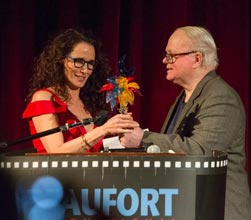
Andie McDowell and Pat Conroy at BIFF
Last week, when Pat Conroy stood up to present an award to Andie MacDowell at the 9th Annual Beaufort International Film Festival, he said, “As the first thing you’re seeing after watching a video montage of Andie MacDowell’s career, I have never felt uglier in my life.”
The audience howled – it was classic Conroy – but something he said later struck a serious note with me. Speaking of movie stars, he said (and I paraphrase), “The ancient Greeks were not the only ones who needed gods and goddesses. People have always needed them, since the beginning of human history, and we still do.”
The irony, of course, is that Pat Conroy is an Olympian himself –Beaufort’s official celebrity, the one on whom we project all our hopes and dreams and highest aspirations… not to mention our love. Sitting at the BIFF Awards that night, it dawned on me that even the gods and goddesses among us need . . . well, gods and goddesses. There was Pat Conroy, thrilled to be presenting an award to the radiant actress he “falls in love with again” every time he sees her on screen. And there was Andie MacDowell, whom I happen to know rearranged her busy schedule and came to Beaufort on the promise of meeting the great Pat Conroy.
How cool is that? Famous people are just like us. Well, sort of. If it weren’t for the fame, I mean. Fame is a game changer.
I work part-time for Pat Conroy, so I think I have some idea of the heavy burden fame can impose. (I know… I know… cry me a river, right? But seriously, hear me out.) I don’t think I’ve ever met a man who enjoys people – meeting them, talking to them, hearing their stories – more than Pat Conroy does. Sit on his porch with a few friends, and you’ll see a man in his element, listening and laughing and relishing the company. And yet, the very thought of a cocktail party fills his heart with dread. I’m sure it’s the same for Andie MacDowell. I watched them both at a private reception at the Cuthbert House last week (media perk!), and here’s what I observed: There are two distinct ways that people approach celebrities in public. With Andie – yes, she replied to my tweet last week, so I’m now calling her “Andie” – people were kind of playing it cool, orbiting around her without directly approaching, eyeing her with shy hopefulness before sidling over casually. “Oh, hello. You look familiar. Haven’t I seen you somewhere? What? You’re Andie MacDowell? Fancy meeting you here… at a reception for Andie MacDowell…” With Pat, it was the opposite approach. He walked in the front door and literally never made it out of the entrance hall into the party proper. He was swarmed. Signing books, smiling for pictures, shaking hands, trying not to suffocate . . .
Two different celebrities, two different takes on the “celebrity treatment.” The party was for them, in their honor, but all I could think about was how awkward and isolated they both must have felt there.
I first started pondering the fame phenomenon – mixed blessing that it is – five years ago when Blythe Danner was the guest of honor at BIFF. It was Pat Conroy who presented her award, too, and I had them both in mind when I wrote:
Ironically, many of those whom we treat as idols – setting them up like alabaster figures on some ridiculously high pedestal from which we, perversely, also enjoy knocking them – are those who have shown us their truest selves, who have “kept it real,” urging us to look beneath the surface of this image-obsessed world we inhabit. We ache for genuine human connection in this superficial age, and when we find it in art – in word or music or on screen – we repay the artists by dehumanizing them . . . or super-humanizing them . . . or something. We reward them by making them “celebrities” and treating them as something . . . other. We forget why we loved them in the first place: Because they were so much like us.
If you read my column in our last issue, you know my favorite thing about Andie MacDowell, the actress, is her voice – that salty-sweet dash of “southern” that makes her sound (and seem) like the girl next door, despite her iconic beauty. With the help of that voice, she imbues her characters with a familiarity, a genuine down-to-earth-ness, that I find rare in a movie star. Pat Conroy does something similar with his writing, I think. His prose style can be as over-the-top gorgeous as Andie MacDowell’s close-up, yet woven through that extravagant language is a bruised, vulnerable voice that we recognize, and it is our own.
We need our “gods and goddesses,” I think, not because they are divine . . . but because they are human. They are us, writ large. They remind us of just how beautiful we are, how lovable we are. They bear the burden of our collective admiration, affection, and wonder – and it is a burden, I’d guess, when you know yourself to be just as screwed up as the next person – and they reflect it back on us, that we might remember who we are . . . who we were made to be.
With the flash and glamour of BIFF in the rearview mirror, I’ve been trying to settle into the reflective season of Lent, which it seems everyone is into these days, Christian or not. Everybody I know is giving something up; it’s all the rage. As for me, I’ve taken up a few things, including a daily reading of something spiritual. Y’all know my go-to guy is C.S. Lewis; I find he has something to say about everything – even our current topic.
In The Weight of Glory, Lewis writes that we are all potential gods and goddesses. “There are no ordinary people,” he says. “You have never talked to a mere mortal. Nations, cultures, arts, civilizations – these are mortal, and their life is to ours as the life of a gnat. But it is immortals whom we joke with, work with, marry, snub, and exploit – immortal horrors or everlasting splendors.”
We adore our celebrities, I think, because through them, we can imagine ourselves everlasting splendors . . . perfected and transcendent and deeply loved. So we skulk around them at parties, or throw ourselves at their feet, or send them fawning tweets, or whatever we must do to connect with that vision. They are no more divine than we are – no less, either – but they’re here to remind us that we all bear the weight of glory. That seems like a lot of pressure, doesn’t it?
Bless their hearts. Ours, too.
Margaret Evans is the editor of Lowcountry Weekly. Read more Rants & Raves here or visit her blog at www.memargaret.com







